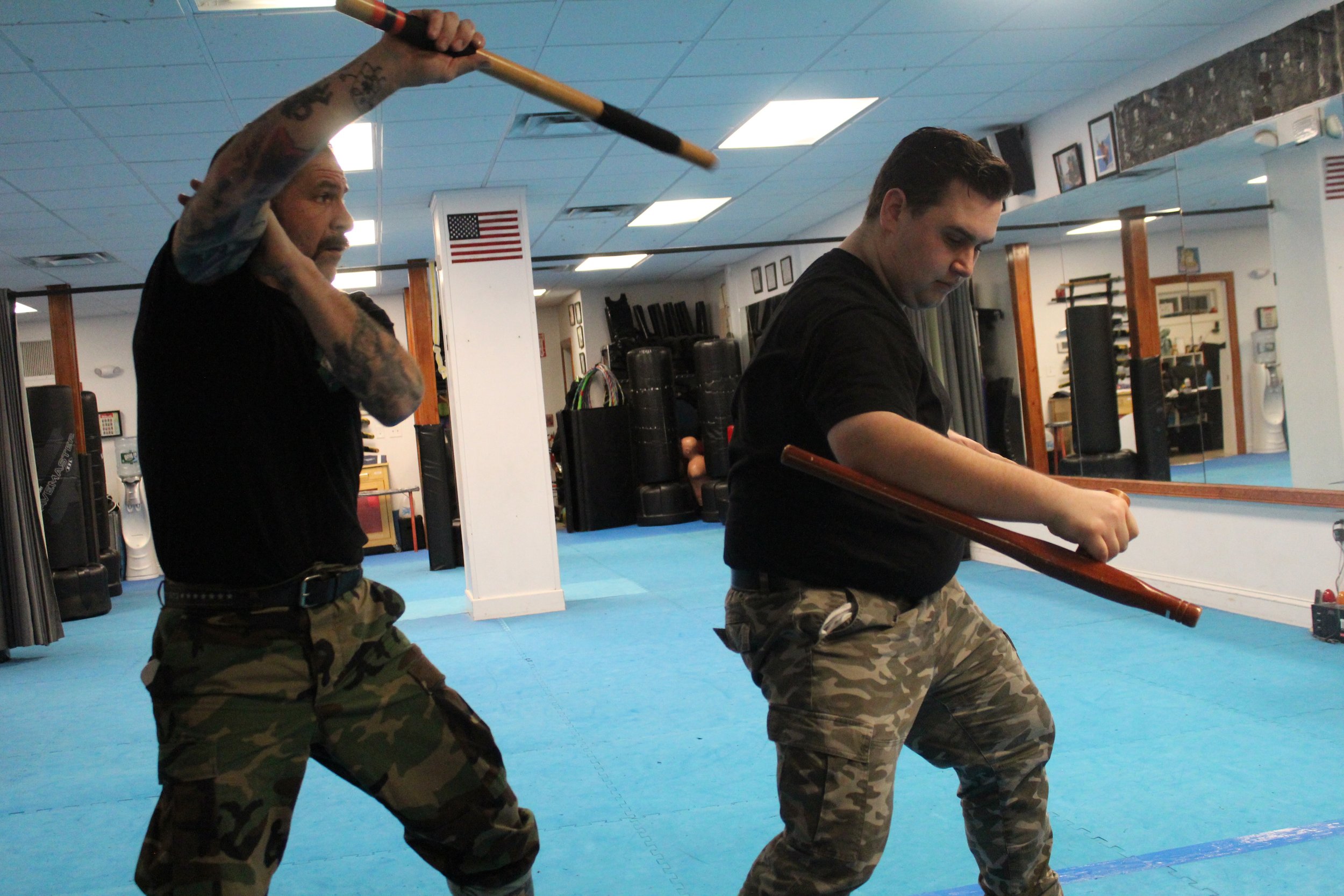
Kali
The Dekiti-Tirsia Siradas System is part of the ancient Filipino combat and survival systems indigenous to the island of Negros in the Visayan Region of the Philippines. This fighting art is very combative with emphasis on impact and bladed weapons as well as empty hand techniques and even firearms.
Established in 1850 by Norberto Tortal from all his knowledge and exposure to the arts of Negro, It has been handed down from generation to generation. Norberto’s son Segundito Tortal was next in line, with his father imparting all the knowledge he had amassed. Segundito then taught it to his 3 sons Conrado, Balbino, and Francisco. Balbino then began the education of his young son Jerson(Nene) Tortal.
The name of the system consists of three words from the Ilonggo dialect. Dekiti translated into the Tagalog dialect is “Malapit” of “Dekit”. In English, it means very close or near. Its emphasis is on close-quarter Tirsia means “gua sa wala” or “sa tuo” or quartering in fighting, Sirradas means to push the enemy to a corner or an area with a three-corner side preventing him from escaping or running away from you delivering multiple deadly blows and thrusts. Siradas means to stop your opponent from getting in or out, for the opponent not to be able to penetrate in any angle of attack.
Further development was created from the combined expertise of the Tortal brothers, Conrado, Balbino, and Francisco
Nene Trtal’s Uncle, Conrado Tortal was assigned as Chief of Police of Victorias, Negros Occidental, Philippines during the Commonwealth Period.
Victorias was a sugar plantation town and there were very frequent skirmishes among the Sacadas (sugarcane workers). Using their Espading (a straight, very sharp, medium length, flat, and thin blade used to cut sugarcane), they would attack rival Sacadas and even the police. Being in charge of peacekeeping, Conrado Tortal frequently relied on his Kali to protect the lives of others.
There is one story of a challenge match that Coronado was involved in. Don Gregorio Araneta from Bago City, Negros Occidental invited the famous and the number one bastonero from nearby Panay Island, Tansiong Padilla of Iloilo to a match against Conrado Tortal, elder brother of Balbino Tortal. The match was to be held publicly during the fiesta of Bago City.
The rule was to have both fighters stand on coconut shells and their weapons (stick and dagger) covered with charcoal dust. Anyone marked or stained with charcoal on their shirt will lose.
But Conrado was an expert in close-quarter knife fighting. He threw an unconventional daga or dagger method of attack that shocked his opponent.
Padilla froze for a split second giving Conrado a chance to successfully penetrate the opponent’s defense causing Padilla to lose the match.
Balbino Tortal, younger brother of Conrado Tortal and father of Grand Tuhon Jerson Tortal Sr, was a member of the National Volunteer Citizens Army.
Before the dark clouds of World War II loomed over the Far East, Philippine Commonwealth President Manuel L. Quezon, proclaimed the National Volunteer Citizens Army as a response to the growing threat of invasion by the Japanese Imperial Army.
Grandmaster Jerson Tortal Sr. was born on June 13, 1937. Fondly called “Nene ” (Nene was the common nickname for a little girl in the Philippines) because of his small stature, “Nene” Tortal was determined to become one of the legendary grandmasters of Kali. Nene started his training early at the tender age of seven with his father Balbino Tortal and later with his uncles Conrado and Francisco. Even as a child, Jerson Tortal Sr. fought courageously for his country.
During World War II, he accompanied his father, Balbino Tortal, a guerrilla fighter to the many meetings of the Crusader Army, an underground resistance movement against the Japanese Imperial Army on Negros Island.
Being a small child, the Japanese did not suspect Jerson performed intelligence for the Crusader Army. He played near the Japanese garrison and befriended them by exchanging wild tomatoes for sugar, all the while gathering information for the underground resistance. “Nene” Tortal stood by his father to the last minute as they fought the Japanese.
One very significant event took place at the closing of World War II. When Balbino Tortal and his family move to the town of Talisay, Negros Occidental, they encountered a group of Japanese soldiers. The family stopped then the soldiers took Balbino away. But his son Jerson Sr. still accompanied him.
The Japanese officer ordered Balbino to be killed. A soldier thrust his bayonet but Balbino sidestepped and evaded it. The officer drew his katana (Samurai Sword) and attacked but Balbino disarmed him and used the katana to attack him and rest the soldiers killing many of them.
Unfortunately during the fight, Balbino Tortal was trapped among coconut trunks and then shot. Jerson was also attacked but fortunately slid down a deep ravine where the soldiers could not find him.
The rest of the family escaped to safety because of the heroism of Balbino Tortal.
Spreading the art
Since the early days of SGM Nene Tortal has spread Dekiti Tirsia Siradas throughout the Philippines and throughout the world. In 1958 he was one of the founding fathers of the negros Bastoneros, as well as many other organizations on his home island of Negros, as well as organizing full contact stick fighting events throughout the island. He was also a fierce competitor.
Winning the first Grandmaster Championship in Cebu. SGM Tortal has taught internationally as well having students in Europe as well as North and South America. Dekiti Tirsia Siradas is a strong family system that will last many millennia.